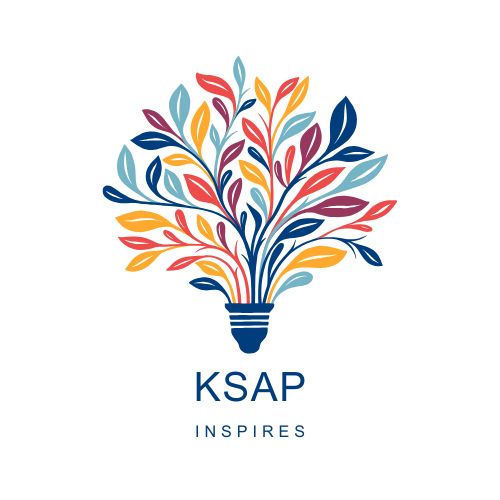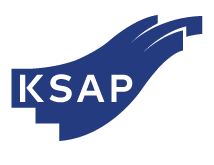KSAP INSPIRES!
According to the Dictionary of the Polish Language, the word ‘”INSPIRATION” means creativity, enthusiasm and influence exerted on someone, suggestion. Why is inspiration important? Looking for inspiration allows us to develop, expand our skills, knowledge and gain new experiences. Finding inspiration at work and in professional development can be crucial for achieving success and professional fulfillment. Finding inspiration for changes in administration is crucial for its effective operation and, as a result, adequate satisfaction of citizens' needs.

In September 2024 KSAP started implementing a project titled "KSAP inspires!". As part of the project, we invite KSAP students and graduates, public administration employees and members of KSAP community to meet at KSAP the experts and outstanding personalities from the world of administration, politics, culture, business, from Poland and abroad.
Objective of the project
We want KSAP to become a center for inspiring discussions on public affairs, a place where dialogue takes place and topics important for administration are discussed. The meetings at KSAP will serve to integrate the public administration community, to provide a space for exchanging experiences and good practices, and to build networks.
KSAP inspires!
Addresses of the project
The project is targeted at KSAP students and graduates, all public administration employees interested in innovations and in a different look at already known issues and phenomena.
Form of meetings
Meetings are held once a month, at 16:30 – 18:30, in the form of a 20-minute inspiring lecture, followed by a moderated discussion. The speeches are recorded and available post factum on the KSAP website, with the possibility of listening at any time. Ad hoc meetings are also proposed to KSAP audience.
Schedule of meetings:
The first meeting was held on 26 September 2024. The title was “Different generations in administration – together or separately?” Tadeusz Reimus, practicing integrative psychotherapist, KSAP consultant and trainer, presented the challenges, but also the opportunities for cooperation between employees of many generations in public administration institutions. Each generation is brought up in different conditions, has different needs and different approaches to work and life. Managing generational diversity in every organization is a big challenge and requires a deep understanding and respect for the unique characteristics, experiences, values and expectations of each generation.
Second meeting (ad hoc meeting) was organized on 15 October 2024, entitled “Good governance in the interconnected world” . Discussion with KSAP guest, David Zapolsky, Vice President for Global Public Policy and General Counsel (Senior Vice President, Global Public Policy & General Counsel), representing Amazon - one of the largest companies in the world, focused on how to construct a mission, vision and organizational strategy in the context of implementing technological innovations and ethical management. How to reconcile the introduction of innovations, especially technological ones, and responsible management? How can organizations develop new products and services while ensuring ethical standards and compliance with the law?
The third meeting, on 22 October 2024, was devoted to the topic of knowledge management in the public sector: strategies and practices . Professor Paweł Wyrozębski from the Warsaw School of Economics helped us to understand how to properly design a knowledge management system and, together with the participants, tried to find the answer to the question whether or why it is worth using a systemic approach to knowledge management. Professor Wyrozębski also presented examples of solutions and good practices used in public institutions in Poland and around the world, showing how knowledge management can support the development and innovation of the public sector.
The meeting on 19 November 2024, was titled „The diplomacy in the modern world. How can it be effective and how can every official find his way in it?” . The ambassador Tomasz Orlowski talked about diplomacy understood as a set of professional skills, work methods and techniques for conducting international contacts, which are used not only by diplomats. Traditional diplomacy, seen as discreet conversations in the privacy of offices, gave way throughout the 20th century to public diplomacy, where governments were persuading societies to follow their foreign policies. In the 21st century, diplomacy goes a step further to transform into social diplomacy, which makes the needs and expectations of public opinion the goal of policy. Diplomacy without diplomats is a formula in which more and more people (not only Foreign Affairs officials) participate in international contacts, and the skills they have developed in diplomacy become the best form them.
The meeting on 12 December 2024, with Elżbieta Bieńkowska (KSAP graduate, former EU Commissioner for the Internal Market, Industry and Entrepreneurship, former Deputy Prime Minister and Minister of Development and Infrastructure) is entitled „Poland in the EU – how to strengthen its position and maintain the unity of the Union? Common market, competitiveness, budget” .
On January 1, 2025, Poland will take over the six-month presidency of the EU Council. As part of the Presidency, we will host nearly 400 councils, meetings and conferences with the participation of representatives of 27 countries. The Presidency of the EU Council is held in a rotation system by all member states for 6 months each. Representatives of the country holding the Presidency of the EU Council, both at the ministerial and expert level, are responsible for setting the agenda of meetings of individual bodies of the EU Council and conducting negotiations among the member states. This is a chance for us to present the Polish point of view on issues important to the EU. How to strengthen your position while respecting the value of the unity of the Union? How to formulate the Polish position so that it provides support and inspiration for achieving common goals in the EU?
The common market ensures the free movement of goods, services, capital and people. It makes everyday life easier, stimulates economic growth and stimulates innovation. How to increase the resilience of the single market? How important is its stability? What can we as Poland do in this regard during the presidency?
How should the Polish administration be prepared to fulfill the obligations arising from the presidency? What competences should Polish officials have? What are the tasks of leaders, experts, task and process coordinators
The first meeting in 2025, on 16 January , was devoted to the state-economy relationship. Our guest was Professor Witold Orłowski, an economist, an academic lecturer and a popular economic commentator.
Professor Orlowski was talking about the role of the state, including public administration, in the state-economy relationship. The state has various tools that can affect the economy and each of those tools has slightly different characteristics, capabilities and limitations. How to use them effectively? What should an official know in this regard? What influence does the administration have, and what – politicians?
During his speech, entitled “How much of the state in the economy?”, Professor Witold Orłowski presented the key aspects of the broadly defined topic of state and market:
- Controversies caused by the role of the state in the economy. For some nations (especially in Europe), a "big state" is something natural. For others, especially for the vast majority of Americans, it is an evil that must be fought.
- Differences in the scale of the state's presence in economies, measured by the ratio of expenditures/taxes to GDP, resulting from the tasks that societies assign to the state.
- Economic problems that may result from the state's insufficient performance of its functions.
Moreover, Professor Orlowski tried to answer the questions:
- How should the state fulfill its tasks efficiently, without stifling economic freedom or jeopardizing financial balance?
- What might the state's involvement in the economy look like? Can the state cope with certain problems better than the market forces?
On March 20, 2025 we hosted Pamela Krzypkowska, an expert in digitalization and new technologies, director of the Department of Research and Innovation at the Ministry of Digital Affairs.
Her lecture was entitled
"Artificial Intelligence in Public Service: Where Is AI’s Place in Government Offices?"
.
Nowadays, artificial intelligence (AI) is becoming increasingly widespread and is influencing various aspects of our lives. One of the areas where AI must find its application is public administration. But how and where can the administration use the power of AI in a safe and optimal way? In her speech, Pamela Krzypkowska explained how AI can support the work of civil servants and streamline administrative processes. She also provided practical tips and inspiration for those interested in implementing AI in their public organizations.
The guest of the meeting on 8 May 2025 was Bartłomiej Brach, author of the book "Between the sense and nonsense of work". The title of his presentation was „My job in the administration doesn't make sense? And if so, what now?” . In Poland, every fourth employee does not feel the meaning of their work. There may be many reasons, but all of them can lead to the feeling that one’s work is meaningless.
And what does it look like in the administration? Almost every one of us, at some point in our professional life, has encountered a task, process, challenge in which we did not see the meaning. Experience and knowledge told us that the solution was somewhere else, that there were easier s or completely different paths leading to it… Lack of a clear goal, underestimation of efforts, monotony of tasks, lack of autonomy, poor communication, repetitive tasks without the possibility of development and many other factors make us wonder if this is really our place in life?
The lack of a sense of purpose in work is a triple loss. First, for employees, who are more likely to struggle with low self-esteem, existential emptiness, and lack of life satisfaction. Second, for organizations, whose employees are less engaged in work and leave it more quickly. Third, for a society that uses human capital inefficiently.
To reduce or even prevent these losses, we first need to better understand where this sense of meaninglessness comes from. That is why Bartłomiej Brach invited the audience to talk about the key factors that lead to a lack of meaning in work and presented several practices (individual and organizational) that can help deal with a sense of meaninglessness.
The title of the meeting on 10 July 2025 was “A Treasure in Your Office – How to Discover and Exploit It? Potential at Your Fingertips – How to Unleash It in Administration? Inspirations from The Agricultural and Food Quality Inspection”.
Every employee has potential that often remains untapped. This is not due to a lack of ability, but rather a lack of conditions that support action—tools, space, encouragement, or mechanisms for submitting ideas. Routine and task overload, especially in administration, limit time for reflection and creativity. Organizational culture also matters—if proactivity isn’t encouraged, employees may feel it’s not their role to take initiative.
Change doesn’t have to be revolutionary. Improving a single process, suggesting a new approach, or sharing an idea can foster a culture of openness and engagement.
Everyone can be a change-maker. All it takes is creating an environment where employees feel like co-creators, not just executors. This is an investment that benefits both the organization and its people.
Our guests from The Agricultural and Food Quality Inspection shared with us the inspirations that have led employees of this institution to approach their tasks differently. Work efficiency and employee satisfaction have increased. During the event, the invited guests showed how to unleash creativity in a team and how – using the project method – give employees the opportunity to find their feet in new roles: initiators, change leaders, and innovators.
The invited speaker of the meeting on 24 September 2025 was Professor Jacek Czaputowicz, the former Minister of Foreign Affairs (2018-2020) and former Director of KSAP (2008-2012), author of numerous publications in the field of international relations, including "Poland and Trump. How We Became an Important US Ally".
Administrations in Dialogue: Poland and the USA in the Trump Era
What did cooperation with the US look like from the inside? How did Donald Trump's presidency impact Polish-American relations?
In this session, Professor Jacek Czaputowicz shared behind-the-scenes insights into working with the US administration—covering negotiations, informal influence, and strategic dynamics. It’s a rare chance to understand how Poland navigated diplomacy with one of the world’s most powerful governments.
Topics included:
- Key outcomes of Poland–US cooperation during Trump’s first term
- The impact of US support for Israel on Polish interests
- Poland’s role in the UN Security Council
- The importance of a professional foreign service
- Current challenges in Polish foreign policy and administration
Innovation in Public Administration: Rethinking Management and Mindsets
Innovation means implementing new or improved solutions that bring real value—better efficiency, quality, or problem-solving. In public administration, this includes digital services, new management methods, policy experimentation, and organizational changes that enhance performance and citizen satisfaction.
A broad topic of Innovation was developed by Krzysztof Gulda, entrepreneur, researcher, strategist in the public and private sectors, international consultant, acting president of the Polish Agency for Enterprise Development (PARP) from August 2025.
Key questions:
- Can public officials be entrepreneurial and innovative?
- Does administration need change and experimentation?
- What mindsets should be fostered in the civil service?
This topic invites to the reflection on innovation and entrepreneurship in government, showing how modern management can support institutional growth. In today’s fast-changing world, openness to new solutions is essential.
Legal challenges in the use of AI in public administration was the title of the meeting on 20 November 2025 with Professor Grzegorz Sibiga, head of the Administrative Law Department at the Institute of Legal Sciences of the Polish Academy of Sciences, expert in personal data protection and electronic administration.
The issues discussed included, among others:
- Can a public official trust a decision made by an AI system?
- What legal risks are associated with automating administrative processes using AI?
- How will the Artificial Intelligence Act and other regulations from the EU’s digital package affect the functioning of electronic public administration?
The use of artificial intelligence in public administration is not only about technology—it also involves a wide spectrum of new, often non‑obvious legal challenges. Even defining the concept of “artificial intelligence” in a legal context raises numerous questions. Depending on the type of algorithm and its application, various problems arise in the application of law, which may affect the legality of administrative actions.
On the one hand, we are dealing with new regulations—both EU‑level and national—that attempt to keep up with the dynamic development of technology. This involves not only the Artificial Intelligence Act, but an entire package of provisions that redefine the boundaries of responsibility, transparency, and oversight. On the other hand, public administration must still comply with existing norms—from administrative law to copyright law—which raises questions about the legal conformity of administrative actions and the protection of citizens’ rights.
The title of the lecture held on 16 December 2025, just before Christmas, was How to communicate at the Christmas Eve Table?
The lecturer was Michał Rusinek, a literary scholar, translator, and writer, member of the Polish Academy of Arts and Sciences, the Council for the Polish Language at the Polish Academy of Sciences, and the Polish PEN Club.
We speak, we listen, we converse. Every day we hold conversations and try to come to an understanding — with a partner, a child, a neighbour, a shop assistant, an employee, or a boss. Some need to communicate with journalists, others with politicians, and still others with internet users.
We communicate directly—face to face—or through the media: radio, television, or newspapers. We also use fast forms of contact, such as text messages, e‑mails, or messaging apps. We send messages and receive them, but apart from talking, chatting, and overtalking, what we care about most is reaching an understanding.
This will matter to us especially when we sit together with the whole family at the Christmas Eve table. This kind of rapport allows both sides to achieve communicative success and to maintain dignity in situations that are not always easy. Whether we deliver a speech or have a conversation, we use language, facial expressions, gestures, and follow the rules governing their use. From an early age we learn these principles and gradually become more communicatively competent. Yet sometimes, as adults, we realize that we have not developed all these skills.
What can we do? Instead of complaining that reaching an understanding is difficult—especially in today’s Poland—it is worth reaching for something positive. The author suggests turning to ancient rhetoric, which was—and still is—the art of communication. Even at the table.
Poland as a Hub for Ukraine’s Reconstruction – Is It Possible After the War?
Can Poland become a fully-fledged player in the process of rebuilding Ukraine once the war is over? This question is becoming increasingly relevant in the context of the geopolitical, economic, and social challenges our region is facing.
On 15th January 2026, with our Guest, Paweł Kowal, Chairman of Foreign Affairs Committee and Chairman of the Council for Cooperation with Ukraine, we discussed the role Poland may play in Ukraine’s reconstruction and whether we are prepared to become a key partner in this process. We considered whether Poland can serve as a logistical, advisory, and investment center. We examined the mechanisms of cooperation between public administration, business, and international organizations that will be essential for implementing ambitious reconstruction projects.
Special attention will be given to the cooperation between Polish and Ukrainian administrations—both at the governmental and local levels—and to the role of joint committees, working groups, and communication platforms in ensuring effective coordination of activities.
We also addressed challenges related to governance, i.e. transparency, anti-corruption measures, and risk management in multilateral projects.




















